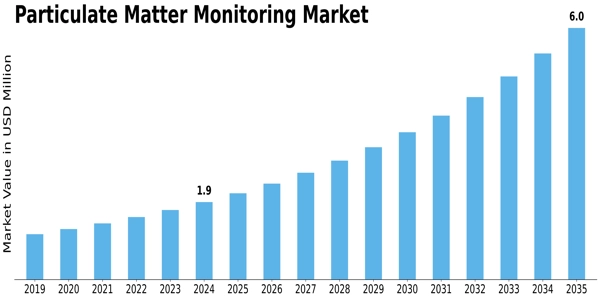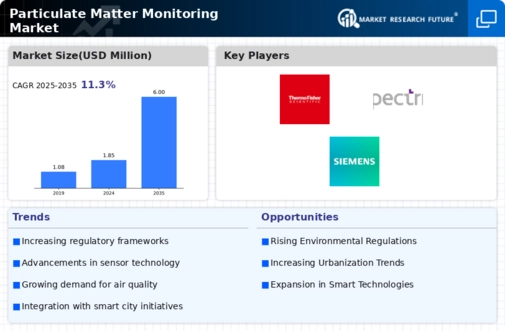-
EXECUTIVE SUMMARY
-
MARKET INTRODUCTION
-
Definition
-
Scope of the Study
- Research Objective
- Assumptions
- Limitations
-
RESEARCH METHODOLOGY
-
3.1.
-
Overview
-
Data Mining
-
Secondary Research
-
Primary Research
- Primary Interviews and Information Gathering Process
- Breakdown
-
of Primary Respondents
-
Forecasting Model
-
Market Size Estimation
- Bottom-Up Approach
- Top-Down Approach
-
Data Triangulation
-
Validation
-
MARKET DYNAMICS
-
Overview
-
Drivers
-
Restraints
-
Opportunities
-
MARKET FACTOR ANALYSIS
-
5.1.
-
Value Chain Analysis
-
Porter’s Five Forces Analysis
- Bargaining
- Bargaining Power of Buyers
- Threat of
- Threat of Substitutes
- Intensity of Rivalry
-
Power of Suppliers
-
New Entrants
-
COVID-19 Impact Analysis
- Market Impact Analysis
- Regional
- Opportunity and Threat Analysis
-
Impact
-
GLOBAL PARTICULATE MATTER
-
MONITORING MARKET, BY PARTICLE SIZE
-
Overview
-
PM1
-
PM2.5
-
PM5
-
PM10
-
GLOBAL PARTICULATE MATTER MONITORING MARKET, BY
-
TYPE
-
Overview
-
Indoor Monitoring
-
Outdoor Monitoring
-
GLOBAL PARTICULATE MATTER MONITORING MARKET, BY TECHNOLOGY
-
Overview
-
Light Scattering
-
Beta-Attenuation
-
Gravimetric
-
8.5.
-
Opacity
-
Others
-
GLOBAL PARTICULATE MATTER MONITORING MARKET, BY
-
APPLICATION
-
Overview
-
Process Industries
-
Ambient Air
-
Monitoring
-
Indoor Air Monitoring
-
Healthcare
-
Others
-
GLOBAL PARTICULATE MATTER MONITORING MARKET, BY REGION
-
Overview
-
North America
- US
- Canada
-
Europe
- France
- UK
- Italy
- Spain
- Rest of Europe
-
10.2.1.
-
Germany
-
Asia-Pacific
- China
- Japan
- South Korea
- Australia
-
10.3.2.
-
India
-
10.3.6.
-
Rest of Asia-Pacific
-
Rest of the World
- Middle East
- Latin America
-
10.4.2.
-
Africa
-
COMPETITIVE LANDSCAPE
-
Overview
-
Competitive Analysis
-
Market Share Analysis
-
Major Growth
-
Strategy in the Global Particulate Matter Monitoring Market,
-
Competitive
-
Benchmarking
-
Leading Players in Terms of Number of Developments in the
-
Global Particulate Matter Monitoring Market,
-
Key developments and Growth
- New Product Launch/Service Application
- Merger
- Joint Ventures
-
Strategies
-
& Acquisitions
-
Major Players Financial
- Sales & Operating Income, 2022
- Major Players
-
Matrix
-
R&D Expenditure. 2022
-
COMPANY PROFILES
-
Thermo Fisher Scientific,
- Company Overview
- Financial Overview
- Key Developments
- SWOT Analysis
-
Inc. (US).
-
12.1.3.
-
Products Offered
-
12.1.6.
-
Key Strategies
-
AMETEK (US).
- Company Overview
- Products Offered
- Key Developments
- SWOT Analysis
- Key Strategies
-
12.2.2.
-
Financial Overview
-
Spectris plc (UK)
- Company Overview
- Financial Overview
- Products
- Key Developments
- SWOT Analysis
- Key
-
Offered
-
Strategies
-
ACOEM Group (France).
- Company Overview
- Products Offered
- Key Developments
- SWOT Analysis
- Key Strategies
-
12.4.2.
-
Financial Overview
-
Siemens (Germany)
- Company Overview
- Financial Overview
- Products
- Key Developments
- SWOT Analysis
- Key
-
Offered
-
Strategies
-
APPENDIX
-
References
-
Related Reports
-
-
LIST OF TABLES
-
GLOBAL PARTICULATE MATTER MONITORING MARKET,
-
SYNOPSIS, 2025-2034
-
GLOBAL PARTICULATE MATTER MONITORING MARKET, ESTIMATES
-
& FORECAST, 2025-2034 (USD BILLION)
-
GLOBAL PARTICULATE MATTER MONITORING
-
MARKET, BY PARTICLE SIZE, 2025-2034 (USD BILLION)
-
GLOBAL PARTICULATE
-
MATTER MONITORING MARKET, BY TYPE, 2025-2034 (USD BILLION)
-
GLOBAL PARTICULATE
-
MATTER MONITORING MARKET, BY TECHNOLOGY, 2025-2034 (USD BILLION)
-
GLOBAL
-
PARTICULATE MATTER MONITORING MARKET, BY APPLICATION, 2025-2034 (USD BILLION)
-
NORTH AMERICA: PARTICULATE MATTER MONITORING MARKET, BY PARTICLE SIZE,
-
NORTH AMERICA: PARTICULATE MATTER MONITORING
-
MARKET, BY TYPE, 2025-2034 (USD BILLION)
-
NORTH AMERICA: PARTICULATE
-
MATTER MONITORING MARKET, BY TECHNOLOGY, 2025-2034 (USD BILLION)
-
NORTH
-
AMERICA: PARTICULATE MATTER MONITORING MARKET, BY APPLICATION, 2025-2034 (USD BILLION)
-
US: PARTICULATE MATTER MONITORING MARKET, BY PARTICLE SIZE, 2025-2034
-
(USD BILLION)
-
US: PARTICULATE MATTER MONITORING MARKET, BY TYPE, 2025-2034
-
(USD BILLION)
-
US: PARTICULATE MATTER MONITORING MARKET, BY TECHNOLOGY,
-
US: PARTICULATE MATTER MONITORING MARKET,
-
BY APPLICATION, 2025-2034 (USD BILLION)
-
CANADA: PARTICULATE MATTER
-
MONITORING MARKET, BY PARTICLE SIZE, 2025-2034 (USD BILLION)
-
CANADA:
-
PARTICULATE MATTER MONITORING MARKET, BY TYPE, 2025-2034 (USD BILLION)
-
TABLE
-
CANADA: PARTICULATE MATTER MONITORING MARKET, BY TECHNOLOGY, 2025-2034 (USD BILLION)
-
CANADA: PARTICULATE MATTER MONITORING MARKET, BY APPLICATION, 2025-2034
-
(USD BILLION)
-
EUROPE: PARTICULATE MATTER MONITORING MARKET, BY PARTICLE
-
SIZE, 2025-2034 (USD BILLION)
-
EUROPE: PARTICULATE MATTER MONITORING
-
MARKET, BY TYPE, 2025-2034 (USD BILLION)
-
EUROPE: PARTICULATE MATTER
-
MONITORING MARKET, BY TECHNOLOGY, 2025-2034 (USD BILLION)
-
EUROPE:
-
PARTICULATE MATTER MONITORING MARKET, BY APPLICATION, 2025-2034 (USD BILLION)
-
GERMANY: PARTICULATE MATTER MONITORING MARKET, BY PARTICLE SIZE, 2025-2034
-
(USD BILLION)
-
GERMANY: PARTICULATE MATTER MONITORING MARKET, BY TYPE,
-
GERMANY: PARTICULATE MATTER MONITORING MARKET,
-
BY TECHNOLOGY, 2025-2034 (USD BILLION)
-
GERMANY: PARTICULATE MATTER
-
MONITORING MARKET, BY APPLICATION, 2025-2034 (USD BILLION)
-
FRANCE:
-
PARTICULATE MATTER MONITORING MARKET, BY PARTICLE SIZE, 2025-2034 (USD BILLION)
-
FRANCE: PARTICULATE MATTER MONITORING MARKET, BY TYPE, 2025-2034 (USD
-
BILLION)
-
FRANCE: PARTICULATE MATTER MONITORING MARKET, BY TECHNOLOGY,
-
FRANCE: PARTICULATE MATTER MONITORING MARKET,
-
BY APPLICATION, 2025-2034 (USD BILLION)
-
ITALY: PARTICULATE MATTER
-
MONITORING MARKET, BY PARTICLE SIZE, 2025-2034 (USD BILLION)
-
ITALY:
-
PARTICULATE MATTER MONITORING MARKET, BY TYPE, 2025-2034 (USD BILLION)
-
TABLE
-
ITALY: PARTICULATE MATTER MONITORING MARKET, BY TECHNOLOGY, 2025-2034 (USD BILLION)
-
ITALY: PARTICULATE MATTER MONITORING MARKET, BY APPLICATION, 2025-2034
-
(USD BILLION)
-
SPAIN: PARTICULATE MATTER MONITORING MARKET, BY PARTICLE
-
SIZE, 2025-2034 (USD BILLION)
-
SPAIN: PARTICULATE MATTER MONITORING
-
MARKET, BY TYPE, 2025-2034 (USD BILLION)
-
SPAIN: PARTICULATE MATTER
-
MONITORING MARKET, BY TECHNOLOGY, 2025-2034 (USD BILLION)
-
SPAIN: PARTICULATE
-
MATTER MONITORING MARKET, BY APPLICATION, 2025-2034 (USD BILLION)
-
TABLE 39
-
UK: PARTICULATE MATTER MONITORING MARKET, BY PARTICLE SIZE, 2025-2034 (USD BILLION)
-
UK: PARTICULATE MATTER MONITORING MARKET, BY TYPE, 2025-2034 (USD BILLION)
-
UK: PARTICULATE MATTER MONITORING MARKET, BY TECHNOLOGY, 2025-2034 (USD
-
BILLION)
-
UK: PARTICULATE MATTER MONITORING MARKET, BY APPLICATION,
-
REST OF EUROPE: PARTICULATE MATTER MONITORING
-
MARKET, BY PARTICLE SIZE, 2025-2034 (USD BILLION)
-
REST OF EUROPE:
-
PARTICULATE MATTER MONITORING MARKET, BY TYPE, 2025-2034 (USD BILLION)
-
TABLE
-
REST OF EUROPE: PARTICULATE MATTER MONITORING MARKET, BY TECHNOLOGY, 2025-2034
-
(USD BILLION)
-
REST OF EUROPE: PARTICULATE MATTER MONITORING MARKET,
-
BY APPLICATION, 2025-2034 (USD BILLION)
-
ASIA-PACIFIC: PARTICULATE
-
MATTER MONITORING MARKET, BY PARTICLE SIZE, 2025-2034 (USD BILLION)
-
TABLE 48
-
ASIA-PACIFIC: PARTICULATE MATTER MONITORING MARKET, BY TYPE, 2025-2034 (USD BILLION)
-
ASIA-PACIFIC: PARTICULATE MATTER MONITORING MARKET, BY TECHNOLOGY, 2025-2034
-
(USD BILLION)
-
ASIA-PACIFIC: PARTICULATE MATTER MONITORING MARKET,
-
BY APPLICATION, 2025-2034 (USD BILLION)
-
JAPAN: PARTICULATE MATTER
-
MONITORING MARKET, BY PARTICLE SIZE, 2025-2034 (USD BILLION)
-
JAPAN:
-
PARTICULATE MATTER MONITORING MARKET, BY TYPE, 2025-2034 (USD BILLION)
-
TABLE
-
JAPAN: PARTICULATE MATTER MONITORING MARKET, BY TECHNOLOGY, 2025-2034 (USD BILLION)
-
JAPAN: PARTICULATE MATTER MONITORING MARKET, BY APPLICATION, 2025-2034
-
(USD BILLION)
-
CHINA: PARTICULATE MATTER MONITORING MARKET, BY PARTICLE
-
SIZE, 2025-2034 (USD BILLION)
-
CHINA: PARTICULATE MATTER MONITORING
-
MARKET, BY TYPE, 2025-2034 (USD BILLION)
-
CHINA: PARTICULATE MATTER
-
MONITORING MARKET, BY TECHNOLOGY, 2025-2034 (USD BILLION)
-
CHINA: PARTICULATE
-
MATTER MONITORING MARKET, BY APPLICATION, 2025-2034 (USD BILLION)
-
TABLE 59
-
INDIA: PARTICULATE MATTER MONITORING MARKET, BY PARTICLE SIZE, 2025-2034 (USD BILLION)
-
INDIA: PARTICULATE MATTER MONITORING MARKET, BY TYPE, 2025-2034 (USD
-
BILLION)
-
INDIA: PARTICULATE MATTER MONITORING MARKET, BY TECHNOLOGY,
-
INDIA: PARTICULATE MATTER MONITORING MARKET,
-
BY APPLICATION, 2025-2034 (USD BILLION)
-
AUSTRALIA: PARTICULATE MATTER
-
MONITORING MARKET, BY PARTICLE SIZE, 2025-2034 (USD BILLION)
-
AUSTRALIA:
-
PARTICULATE MATTER MONITORING MARKET, BY TYPE, 2025-2034 (USD BILLION)
-
TABLE
-
AUSTRALIA: PARTICULATE MATTER MONITORING MARKET, BY TECHNOLOGY, 2025-2034 (USD
-
BILLION)
-
AUSTRALIA: PARTICULATE MATTER MONITORING MARKET, BY APPLICATION,
-
SOUTH KOREA: PARTICULATE MATTER MONITORING
-
MARKET, BY PARTICLE SIZE, 2025-2034 (USD BILLION)
-
SOUTH KOREA: PARTICULATE
-
MATTER MONITORING MARKET, BY TYPE, 2025-2034 (USD BILLION)
-
SOUTH KOREA:
-
PARTICULATE MATTER MONITORING MARKET, BY TECHNOLOGY, 2025-2034 (USD BILLION)
-
SOUTH KOREA: PARTICULATE MATTER MONITORING MARKET, BY APPLICATION, 2025-2034
-
(USD BILLION)
-
REST OF ASIA-PACIFIC: PARTICULATE MATTER MONITORING
-
MARKET, BY PARTICLE SIZE, 2025-2034 (USD BILLION)
-
REST OF ASIA-PACIFIC:
-
PARTICULATE MATTER MONITORING MARKET, BY TYPE, 2025-2034 (USD BILLION)
-
TABLE
-
REST OF ASIA-PACIFIC: PARTICULATE MATTER MONITORING MARKET, BY TECHNOLOGY, 2025-2034
-
(USD BILLION)
-
REST OF ASIA-PACIFIC: PARTICULATE MATTER MONITORING
-
MARKET, BY APPLICATION, 2025-2034 (USD BILLION)
-
REST OF THE WORLD:
-
PARTICULATE MATTER MONITORING MARKET, BY PARTICLE SIZE, 2025-2034 (USD BILLION)
-
REST OF THE WORLD: PARTICULATE MATTER MONITORING MARKET, BY TYPE, 2025-2034
-
(USD BILLION)
-
REST OF THE WORLD: PARTICULATE MATTER MONITORING MARKET,
-
BY TECHNOLOGY, 2025-2034 (USD BILLION)
-
REST OF THE WORLD: PARTICULATE
-
MATTER MONITORING MARKET, BY APPLICATION, 2025-2034 (USD BILLION)
-
TABLE 79
-
MIDDLE EAST: PARTICULATE MATTER MONITORING MARKET, BY PARTICLE SIZE, 2025-2034 (USD
-
BILLION)
-
MIDDLE EAST: PARTICULATE MATTER MONITORING MARKET, BY TYPE,
-
MIDDLE EAST: PARTICULATE MATTER MONITORING
-
MARKET, BY TECHNOLOGY, 2025-2034 (USD BILLION)
-
MIDDLE EAST: PARTICULATE
-
MATTER MONITORING MARKET, BY APPLICATION, 2025-2034 (USD BILLION)
-
TABLE 83
-
AFRICA: PARTICULATE MATTER MONITORING MARKET, BY PARTICLE SIZE, 2025-2034 (USD BILLION)
-
AFRICA: PARTICULATE MATTER MONITORING MARKET, BY TYPE, 2025-2034 (USD
-
BILLION)
-
AFRICA: PARTICULATE MATTER MONITORING MARKET, BY TECHNOLOGY,
-
AFRICA: PARTICULATE MATTER MONITORING MARKET,
-
BY APPLICATION, 2025-2034 (USD BILLION)
-
LATIN AMERICA: PARTICULATE
-
MATTER MONITORING MARKET, BY PARTICLE SIZE, 2025-2034 (USD BILLION)
-
TABLE 88
-
LATIN AMERICA: PARTICULATE MATTER MONITORING MARKET, BY TYPE, 2025-2034 (USD BILLION)
-
LATIN AMERICA: PARTICULATE MATTER MONITORING MARKET, BY TECHNOLOGY, 2025-2034
-
(USD BILLION)
-
LATIN AMERICA: PARTICULATE MATTER MONITORING MARKET,
-
BY APPLICATION, 2025-2034 (USD BILLION)
-
LIST OF FIGURES
-
FIGURE 1
-
RESEARCH PROCESS
-
MARKET STRUCTURE FOR THE GLOBAL PARTICULATE MATTER
-
MONITORING MARKET
-
MARKET DYNAMICS FOR THE GLOBAL PARTICULATE MATTER
-
MONITORING MARKET
-
GLOBAL PARTICULATE MATTER MONITORING MARKET, SHARE
-
(%), BY PARTICLE SIZE, 2022
-
GLOBAL PARTICULATE MATTER MONITORING MARKET,
-
SHARE (%), BY TYPE, 2022
-
GLOBAL PARTICULATE MATTER MONITORING MARKET,
-
SHARE (%), BY TECHNOLOGY, 2022
-
GLOBAL PARTICULATE MATTER MONITORING
-
MARKET, SHARE (%), BY APPLICATION, 2022
-
GLOBAL PARTICULATE MATTER
-
MONITORING MARKET, SHARE (%), BY REGION, 2022
-
NORTH AMERICA: PARTICULATE
-
MATTER MONITORING MARKET, SHARE (%), BY REGION, 2022
-
EUROPE: PARTICULATE
-
MATTER MONITORING MARKET, SHARE (%), BY REGION, 2022
-
ASIA-PACIFIC:
-
PARTICULATE MATTER MONITORING MARKET, SHARE (%), BY REGION, 2022
-
FIGURE 12
-
REST OF THE WORLD: PARTICULATE MATTER MONITORING MARKET, SHARE (%), BY REGION, 2022
-
GLOBAL PARTICULATE MATTER MONITORING MARKET: COMPANY SHARE ANALYSIS,
-
THERMO FISHER SCIENTIFIC, INC. (US): FINANCIAL OVERVIEW
-
SNAPSHOT
-
THERMO FISHER SCIENTIFIC, INC. (US): SWOT ANALYSIS
-
FIGURE
-
AMETEK (US): FINANCIAL OVERVIEW SNAPSHOT
-
AMETEK (US): SWOT ANALYSIS
-
SPECTRIS PLC (UK): FINANCIAL OVERVIEW SNAPSHOT
-
SPECTRIS
-
PLC (UK): SWOT ANALYSIS
-
ACOEM GROUP (FRANCE): FINANCIAL OVERVIEW
-
SNAPSHOT
-
ACOEM GROUP (FRANCE): SWOT ANALYSIS
-
SIEMENS
-
(GERMANY): FINANCIAL OVERVIEW SNAPSHOT
-
SIEMENS (GERMANY).: SWOT ANALYSIS







Leave a Comment